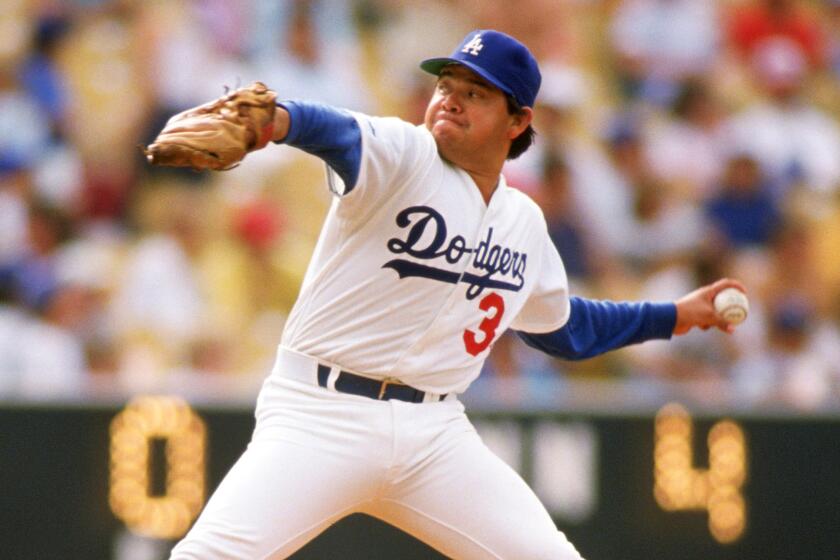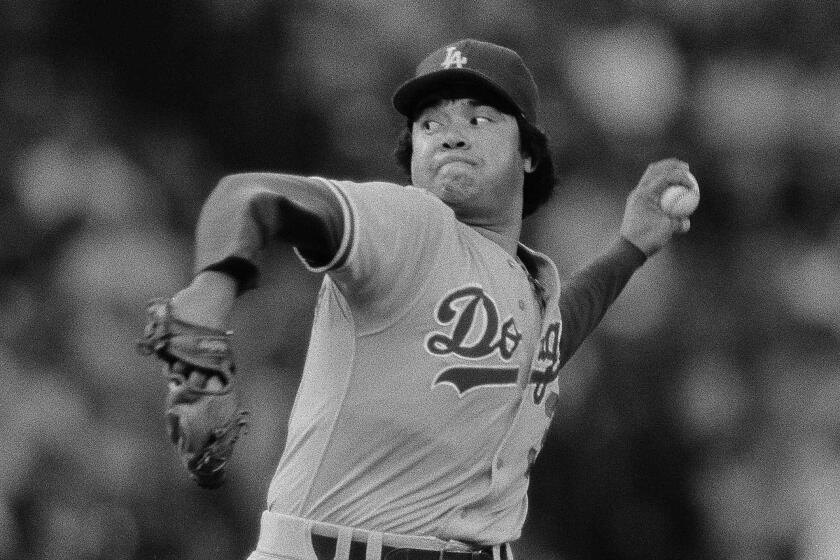
- Share via
Fernando Valenzuela vanished without saying a word, which, in retrospect, was the most Fernando Valenzuela thing he could have done.
Not until he was falsely rumored on social media to have passed away did the Dodgers issue an official statement acknowledging that he stepped away from their Spanish-language radio broadcast. His health problems were never specified.
Valenzuela didn’t demand attention. He didn’t want sympathy.
He didn’t suddenly become like this at the end of his life. This is how he was for the entirety of the 17 years I knew him, carrying himself with quiet pride and understated dignity.
Valenzuela died on Tuesday, the Dodgers announced. He was 63.

As a Cy Young Award-winning rookie pitcher in 1981, Valenzuela forever changed the makeup of the Dodgers’ fan base, but he never behaved as if he was a big shot in the media dining room.
Many retired athletes, especially ones who have reached the peaks of their respective fields, miss the adoration they once received. They enjoy holding court. They like reliving their glorious pasts.
Valenzuela wasn’t like that.
He was typically joined for dinner by two or three people and rarely more. Sometimes, he was alone, headphones in his ears, looking down at his phone.
He wasn’t desperate for the validation of others. He knew who he was and what he was about.
Fernando Valenzuela was more than just a Dodgers pitcher. He was a friendly soul who forged a strong connection between a city and its baseball team.
That made sense. How else would Fernandomania have been possible? How else could a 20-year-old from a small town in Mexico who didn’t speak English or understand anything about this strange city have worked up the nerve to stare down the New York Yankees in the World Series?
His reticent demeanor, coupled with his enormous stature in the game, gave many people the impression that he was unapproachable. The opposite was true.
When I’d ask him what he was watching, he’d show me his phone screen, which was usually streaming a baseball game from Mexico. He’d tell me about the team he owned. He’d tell me about his son who was still playing. He’d tell a related story, crack a joke and complain about his golf game. He was always warm.
He had a quirky sense of humor, and he didn’t have any problems making fun of himself. In 2014, after a then-17-year-old Julio Urías pitched in his first major league spring training game, I went around the Dodgers’ complex looking for Valenzuela and found him in the media dining room. Valenzuela howled with laughter when I relayed an exchange I’d just had with Urías. I’d asked Urías if his father had ever told him stories about Valenzuela. Urías’ response: “My grandfather did.”
Fernando Valenzuela, the Mexican-born pitcher who led the Dodgers to a World Series win and vastly expanded MLB’s Latino fan base, dies at age 63.
Valenzuela the broadcaster was a man of few words, but that wasn’t because he lacked insight.
One day in my early years as the Dodgers beat writer for this newspaper, Valenzuela sat next to me in the press box during a road game in Colorado. Valenzuela started telling me ahead of time what type of pitch was about to be thrown and why. He was right enough times to convince me that he knew everything about baseball, which prompted me to ask him about some disconcerting trend for the Dodgers. I can’t recall what I asked, but I remember his response.
“I don’t know,” he said.
I think he realized he sounded dismissive.
“Look,” he told me, “I really don’t know. Nobody knows. If someone tells you they know, they’re lying. Nobody knows anything about baseball.”

His words stuck with me. So if you’re one of those sycophants who has a problem with the questions I ask Andrew Friedmen, well, blame El Toro.
My conversations with Valenzuela were often brief, but I made sure I said hello to him every day.
Before the 2011 season, I was assigned to write a story on the 30th anniversary of Fernandomania. Valenzuela graciously spent time with me, answering questions about his career and legacy. He joked about how he’d probably fall down if he attempted his look-to-the-heavens windup when throwing out the ceremonial first pitch opening day.
A few days later, he asked me why I hadn’t spoken to him since the interview. I said that when I saw him, he looked as if he was occupied and didn’t want to be bothered. He conveyed to me that he felt used. From that point forward, I made it a point to acknowledge him every day I was at the Dodger Stadium. When I’d touch him on his shoulder, he’d look at me with mock disgust and ask me if my hand was clean. Like I said, he had a quirky sense of humor.
The man lived by a code.
Fernando Valenzuela was a game-changer for the Dodgers, baseball, and Los Angeles
That code led to an estrangement from the Dodgers that lasted more than a decade. His arm diminished by an 11-year run with the team that included six 250-plus-inning seasons, he was upset about how he was waived a week before his $2.55-million contract would have become guaranteed. Valenzuela didn’t return until he was hired by them as a broadcaster a dozen years later.
I suspect his sense of justice was part of the reason why it meant so much to him to have his jersey officially retired by the Dodgers last year. Valenzuela’s signature No. 34 had only been unofficially retired — former equipment manager Mitch Poole made sure no other player wore it — because of an unofficial team policy of solely retiring the numbers of Hall of Famers.
Never mind that Valenzuela should be in the Hall of Fame. How could the Dodgers not retire his number considering what he meant to the team, not only in terms of wins and also, but also financially? Today, many of the fans who pack Dodger Stadium are the children of Valenzuela’s fans, or, in some cases, grandchildren.
Valenzuela knew his worth. He just didn’t talk about it.
More to Read
Are you a true-blue fan?
Get our Dodgers Dugout newsletter for insights, news and much more.
You may occasionally receive promotional content from the Los Angeles Times.














